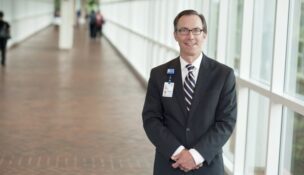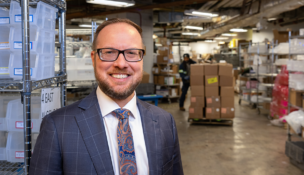Va. bill aims to reduce mental health stigma for health care workers
Current language contributes to fear and silence, advocates say
Va. bill aims to reduce mental health stigma for health care workers
Current language contributes to fear and silence, advocates say
This story has been updated to include the House of Delegates Health, Welfare and Institutions committee meeting on Tuesday.
On April 1, 2020, Dr. Lorna Breen returned to work, with COVID but fever-free. It was the first wave of the U.S. pandemic, and New York was on its way to becoming an epicenter. Nearly 1,400 people had already died from COVID in the city in just a few weeks, and as medical director of the emergency department at NewYork-Presbyterian Allen Hospital in Manhattan, Breen was among the front-line doctors treating the growing number of COVID patients.
About eight days after returning to work, Breen hit a breaking point. Her family arranged to bring her back to Virginia and secured psychiatric care for her from the University of Virginia Health System, recalled Corey Feist, Breen’s brother-in-law and the president and co-founder of the Dr. Lorna Breen Heroes’ Foundation.
“Once we obtained that care and she started to improve, she immediately said to us, ‘Now that I have obtained mental health care, this is going to impact my career and my license to practice medicine,'” Feist said. “And it was one of the last things she told us.”
On April 26, 2020, shortly after being discharged, Breen took her life at her family’s Charlottesville home.
“That is a difference in health care professionals, like doctors and nurses,” Feist said. “They don’t see a different career in their life. This is what they’re about. And so their identity becomes inextricably linked with their profession, and when you take away their ability to serve in that profession, you take everything away from them. It is one and the same. This is exactly what happened to my sister in-law, and sadly, this is exactly what happens to thousands of health care workers across the country.”
Breen’s fear that seeking help meant she could lose her license is a common one among health care professionals, largely a result of questions about seeking mental health treatment on state medical licensing applications, including Virginia’s. This concern contributes to a mental illness stigma and burnout in the field, and ultimately, reduces the public’s access to health care, industry professionals say.
In a move meant to destigmatize seeking mental health help in the health care field, Virginia could change that language in its health care worker licensing applications this year, should new legislation pass.
HB 1573 — approved by a Virginia House of Delegates subcommittee on Jan. 19 — and its companion bill in the state Senate, SB 970, would direct “the Department of Health Professions to amend its licensure, certification and registration applications to remove any existing questions pertaining to mental health conditions and impairment.”
Instead, those applications would ask:
- Do you have any reason to believe that you would pose a risk to the safety or well-being of your patients or clients?
- Are you able to perform the essential functions of a practitioner in your area of practice with or without reasonable accommodation?
The Medical Society of Virginia provided the language for the bill.
“This is a simple thing we can do to encourage people to get treatment,” said Clark Barrineau, MSV’s assistant vice president of government affairs and public policy.
Del. Wendell S. Walker, R-Lynchburg, who introduced the House bill, said, “Virginia’s current language affirms the beliefs that mental health illness underlines a health care provider’s ability to do their job. … Such questions on this license application may cause physicians to forgo seeking psychological, psychiatric care, when they’re suffering from depression, anxiety, or just professional burnout, for fear of losing … their license.”
The bill also contains an emergency clause that would make the law take effect immediately after Gov. Glenn Youngkin signed it.
On Thursday, the Virginia House’s Health, Welfare and Institutions Subcommittee No. 3 voted unanimously to recommend that the full committee report the bill. On Tuesday, the full committee voted to do so unanimously, sending the bill to the House floor. The Senate companion bill, introduced by Sen. Montgomery “Monty” Mason, D-Williamsburg, was assigned to the Health Professions subcommittee of the Senate Education and Health committee, which voted unanimously on Jan. 20 to recommend reporting it to the full committee.
Neighboring states such as North Carolina have changed or removed mental health questions from similar applications for health care worker licensure and certifications, Walker said.
“If these other states are doing it, and we see the concern out here, I just felt like from the responses and what people shared with me, that this is a time that Virginia needs to come around and do the same thing,” he told Virginia Business.
With a shortage of health care professionals, including in his district, providers are working long hours in addition to handling stress and trauma: “There’s no such thing as a 37-, 40-hour workweek when it comes to these providers,” he told Virginia Business.
Stigma contributes to suicide
Virginia’s state license applications ask, “Do you currently have any mental health condition or impairment that affects or limits your ability to perform any of the obligations and responsibilities of professional practice in a safe and competent manner?” The question explains that “currently” means “recently enough” so that the condition could “reasonably” have an impact on the applicant’s ability to function as a practicing physician.
“By this question existing, we know for absolute fact, from our student members, because we represent medical students, and … medical residents … that they don’t go get treatment out of fear of this reality,” Barrineau said. Students and residents fear that they won’t be able to answer the question truthfully and receive their licenses.

Feist was among those speaking in favor of the bill Jan. 19.
“This is a law that we are working to pass today that is going to not only save lives of health care workers, but it will benefit patients, because [providers] will be … able to perform at their best,” he told Virginia Business.
The pandemic exacerbated the existing problem. In late May 2022, U.S. Surgeon General Dr. Vivek Murthy released an advisory titled “Addressing Health Worker Burnout.”
“As the burnout and mental health crisis among health workers worsens,” Murthy wrote, “this will affect the public’s ability to get routine preventive care, emergency care and medical procedures.”
In September 2021, the Virginia Board of Medicine released a brief meant to dispel the misconception that a therapist or colleague would be legally compelled to report a physician seeking help to the state board, telling doctors, “Get help if you need it.”
The American Hospital Association published a study on health care workforce suicide prevention interventions, funded by a Centers for Disease Control and Prevention grant, in fall 2022. The study included a survey that received 158 responses, as well as interviews and focus groups conducted March-April 2022.
The study listed the stigma associated with talking about and seeking behavioral health care as one of three primary drivers of suicide among health care workers. Included in that stigma was a fear from clinicians that seeking care could have “a detrimental effect on their ability to renew or retain their state medical license.”
“This [law] is going to knock down the barriers and create a free and clear pathway and a consistent message to health care workers, which is that they must prioritize own well-being so that they can take the best care of patients,” Feist said.
United Virginians
During the Jan. 19 House subcommittee meeting, representatives from the Medical Society of Virginia, the Virginia College of Emergency Physicians and the Virginia Hospital & Healthcare Association spoke in favor of the bill. Representatives from MSV, VHHA and the National Alliance on Mental Illness (NAMI) advocated for the bill before the Senate subcommittee on Jan. 20.
“I never thought in the 30 years that I’ve been running around here, I would have to spend so much time dealing with suicide and mental health issues, but it is matured ahead of liability issues that we spent a lot of time on over the years,” said Scott Johnson, a partner at Hancock, Daniel & Johnson PC and head of its government relations team who spoke as general counsel to the MSV, on Thursday.
“I think you can ask any physician, throughout the country, we all know somebody who has committed suicide, and a lot of it was during COVID, because we were all overwhelmed,” Dr. Hailey Sparacino, a family care doctor in Lynchburg who also practices advanced surgical obstetrics, told the subcommittee Thursday.
She concluded her remarks by saying, “I think the stigma needs to go away, and I think this bill is a good way to start.”


















